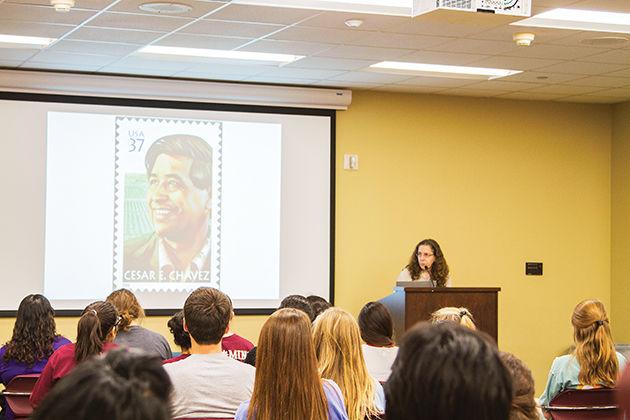Pulitzer Prize-winning author Miriam Pawel addressed a packed Rudder lecture room Wednesday evening on the life and legacy of a man who routinely fasted for social justice.
Pawel, a journalist turned author and historian, flew in from California to give the lecture on the impact of the famous Hispanic-American civil rights activist Cesar Chavez. Her lecture was in observance of Hispanic Heritage month and the 50th anniversary of Chavez’s grape strike in Delano, California.
A&M history professor Felipe Hinojosa, who coordinated the event, said he was thrilled to have Pawel on campus to talk about Chavez.
“For me, it’s a tremendous honor to have her here with us,” Hinojosa said. “She is all over the country, and the fact that she’s here this evening I think speaks a lot to the importance of Texas A&M.”
Pawel said she was intrigued by the fact that while Chavez is now regarded as a saintly figure, many people do not know much about him.
“He’s nearly become kind of erased from history in terms of us knowing who he was and part of that is because he was a complicated person,” Pawel said. “Like any great historic figure, he had strengths and weaknesses and he had successes and also had failures.”
Chavez founded the United Farm Workers Union in the 1960s and was very active in a number of different social issues, namely worker’s rights, through the 1980s. He was a prominent voice for American farmers and Hispanic-Americans and an advocate of nonviolence.
Pawel said the similarities of social justice issues Chavez faced to present day issues are what first spurred her interest in Chavez while she was doing journalism work in 2005.
“People told me that there were farmworkers living in the canyons of San Diego and that they just lived in shacks without any running water or anything else basically,” Pawel said. “That was my window into history — studying the past and trying to understand the present and understand how it was that conditions like this still existed in the 21st century.”
Pawel said many of the other issues Chavez faced mirror today’s headlines.
“Many of the issues he dealt with like citizenship, police brutality, and guest worker programs are really the same issues that we’re facing in many places today,” Pawel said.
Political science junior Cindy Barahona said she was glad to be a part of the crowded audience.
“We don’t know much about Cesar Chavez in our history classes, so as a Latina student I felt like this is an especially important thing to know about in the history of this country,” Barahona said.
Hinojosa said Chavez is a figure that should be analyzed more for the activist roles he played.
“At the end of the day there are many stories that we don’t know about that we need to learn more about,” Hinojosa said. “Issues that presidential candidates are talking about now in terms of immigration and in terms of labor and so forth have been a long part of the discourse and the narrative of American history.”
Barahona said she hopes the lecture helps spur interest in Hispanic-American history.
“Mexican-American history is such an amazing subject because you learn so much about people that you don’t know about like him that you just don’t know about before you take those classes,” Barahona said.
Barahona, who is currently in one of Hinojosa’s classes, said she hopes more people do start to learn about Chavez and his impact.
“He made such a huge change for people, especially for people who needed it the most and didn’t have any protection,” Barahona said. “I would really love for people at Texas A&M to know more about Cesar Chavez because he was such a great man.”









